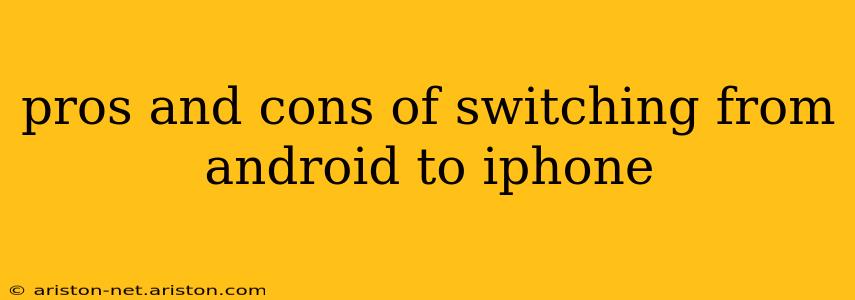Pros and Cons of Switching from Android to iPhone: A Comprehensive Guide
Switching from Android to iPhone is a big decision, one that requires careful consideration of your needs and preferences. Both operating systems offer compelling features, but they cater to different user experiences. This guide will weigh the pros and cons to help you make an informed choice.
What are the Advantages of Switching to iPhone from Android?
1. Seamless Ecosystem Integration: This is arguably the biggest draw for many iPhone converts. Apple's ecosystem, encompassing iPhones, iPads, Macs, Apple Watches, and AirPods, offers unparalleled integration. iMessage, iCloud, AirDrop, and Handoff allow for seamless data transfer and continuity across all your Apple devices. This interconnectedness simplifies workflows and enhances productivity.
2. User-Friendly Interface and Simplicity: iOS is known for its intuitive and user-friendly interface. It's generally considered easier to navigate and learn than Android, especially for users new to smartphones. The streamlined design minimizes clutter and prioritizes simplicity.
3. High-Quality Apps and App Store Security: The App Store, while smaller than the Google Play Store, maintains a stricter curation process. This leads to a generally higher quality of apps and a more secure environment with fewer instances of malware. Apple's app review process ensures a consistent user experience.
4. Superior Camera Performance (Generally): While Android phones are making significant strides, iPhones consistently rank highly in camera performance tests. The combination of hardware and software optimization often results in superior image quality, particularly in low-light conditions.
What are the Disadvantages of Switching to iPhone from Android?
1. Higher Price Point: iPhones generally command a higher price than comparable Android devices, especially at the flagship level. This can be a significant barrier for budget-conscious consumers.
2. Less Customization and Openness: Android offers a far greater degree of customization. You can tailor virtually every aspect of your phone's appearance and functionality. iOS, while offering some customization options, is significantly more restrictive.
3. Limited Storage Options and Expandability: Unlike many Android phones that offer expandable storage via microSD cards, iPhones typically come with fixed internal storage. This means carefully choosing a storage capacity upfront, as upgrading later isn't an option.
4. Lack of Widget Functionality (Historically): While iOS has improved its widget functionality in recent years, Android's widget system remains more extensive and customizable, offering greater flexibility in displaying information on the home screen.
What are some other important considerations?
1. Data Transfer: Moving your data from an Android device to an iPhone can be more challenging than transferring between Android phones. While Apple provides tools to assist, the process isn't always seamless and might require some technical know-how.
2. iMessage vs. SMS/MMS: Switching to iPhone means embracing iMessage, Apple's messaging service. While iMessage offers a superior user experience, it limits communication with users who don't have Apple devices. Texts sent to non-iPhone users will be sent via SMS/MMS, which typically offers a less feature-rich experience.
3. Repair Costs: Repairing an iPhone can be more expensive than repairing many Android phones, particularly out of warranty.
Is switching from Android to iPhone worth it?
Ultimately, the decision of whether or not to switch from Android to iPhone depends on your individual priorities and preferences. If seamless ecosystem integration, a user-friendly interface, and superior camera quality are paramount, an iPhone might be the right choice. However, if customization, affordability, and expandable storage are more important, then sticking with Android might be better suited to your needs. Carefully weigh the pros and cons outlined above before making your decision.
